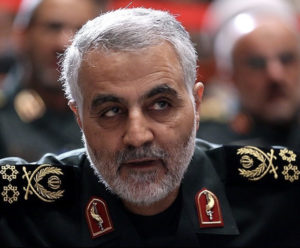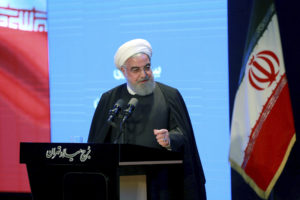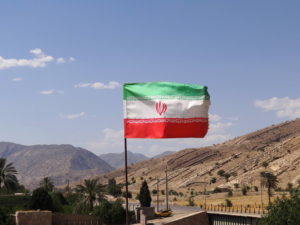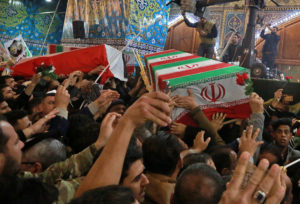Coming Apart at the Seams
Gen. David Petraeus likes to describe the Iraq he envisions as a patchwork quilt. You establish security in a neighborhood over here, bring peace to a village over there, create more and more of these scraps of relative tranquility -- and then stitch the heterogeneous pieces together. The problem is with the seams. They have a tendency to unravel.WASHINGTON — Gen. David Petraeus likes to describe the Iraq he envisions as a patchwork quilt. You establish security in a neighborhood over here, bring peace to a village over there, create more and more of these scraps of relative tranquility — and then stitch the heterogeneous pieces together.
The problem is with the seams. They have a tendency to unravel.
On Thursday, while Petraeus was still in Washington delivering his optimistic progress report, the biggest success he has been touting all week — the decision by Sunni tribal leaders in formerly hostile Anbar province to switch sides and cooperate with the Americans — was ominously threatened. A roadside bomb in Ramadi killed Abdul-Sattar Abu Risha, the most prominent of the newly cooperative sheiks, calling into question the “political shift of seismic proportions” that Petraeus has advertised.
The general was confident that the assassination would not send Anbar back into chaos — that, on the contrary, it would strengthen the resolve of the tribal leaders. Earlier this year, before the “surge” of additional American troops began, the sheiks decided that the best way to rid the province of an increasingly oppressive al-Qaida presence was to work with U.S. occupation forces.
“I think that the tribes will pull together and go after whoever did this,” Petraeus said in an interview with reporters and editors of The Washington Post. But he also acknowledged Abu Risha’s leadership among the sheiks and called his death “a tragic loss … a terrible loss for Anbar province and all of Iraq.”
Meanwhile, another seam appeared to be separating: Political negotiations over a proposed law governing the country’s oil fields were reportedly moving away from a deal, rather than toward one. Strictly speaking, the oil deal isn’t Petraeus’ problem; it’s something for U.S. Ambassador Ryan Crocker to worry about.
“I think that both Gen. Petraeus and Ambassador Crocker are capable people who have been given an impossible assignment,” Sen. Barack Obama said Thursday in a telephone interview. “George Bush has given a mission to Gen. Petraeus, and he has done his best to try to figure out how to put lipstick on a pig.”
Having attended sessions with both Petraeus and Crocker this week, I tend to agree. These aren’t a couple of yahoos on some wild-eyed ideological mission. They are skilled, knowledgeable professionals who understand that their first job is to avoid doing things that would make the situation in Iraq worse than it already is.
If you take as a given that there will be well over 100,000 U.S. troops in Iraq through the end of the Bush administration — and that’s Bush’s unwise decision, not the general’s or the ambassador’s — then creating pockets of stability, and trying to sustain and enlarge them, seems like a reasonable use of those forces.
There’s a disconnect, though. The patchwork strategy that Petraeus and Crocker describe is necessarily slow and painstaking; it requires time for old wounds to heal and enmities to fade. But most of the surge troops that Petraeus is deploying in Anbar and around Baghdad will have to be withdrawn by next summer — not because of anything Bush might decide, but because the Army and the Marine Corps are running out of available forces. And it’s clear that while Republicans in Congress might not be ready yet to force the president to end his Iraq adventure, there is no support for keeping anything like current troop levels in Iraq for, say, a decade or two, to give the Iraqis time to decide if they want to become a nation again.
“This is an ethno-sectarian competition for power and resources,” Petraeus said this week. He described the U.S. role as trying to ensure that Iraqis conduct that competition via politics rather than force of arms. As a soldier, it’s not his job to make U.S. foreign policy; that responsibility, alas, falls to Bush. Petraeus has been handed a bushel of lemons and is trying his best to make something akin to lemonade.
Both he and Crocker said they believe the United States can do considerable good in Iraq. Both men said they believed there were important U.S. national security interests that could be protected there. We heard both men speak optimistically about “success” in Iraq, but they were careful to leave the definition of success open to interpretation. From neither man did we hear any chest-thumping, saber-rattling, or thundering promises of “victory.”
That’s because it’s the Iraqis’ war. We’re just in the middle of it.
Eugene Robinson’s e-mail address is eugenerobinson(at)washpost.com.
© 2007, Washington Post Writers Group
Your support matters…Independent journalism is under threat and overshadowed by heavily funded mainstream media.
You can help level the playing field. Become a member.
Your tax-deductible contribution keeps us digging beneath the headlines to give you thought-provoking, investigative reporting and analysis that unearths what's really happening- without compromise.
Give today to support our courageous, independent journalists.






You need to be a supporter to comment.
There are currently no responses to this article.
Be the first to respond.